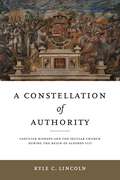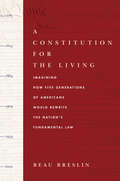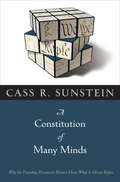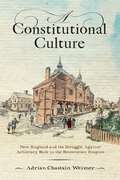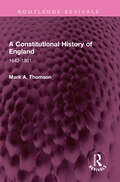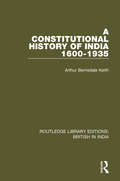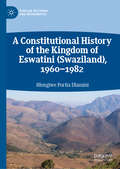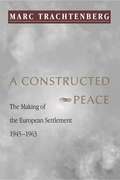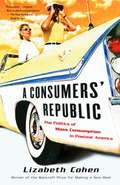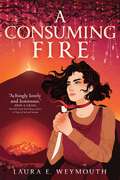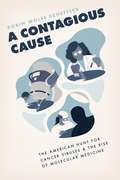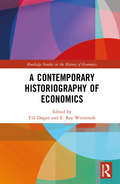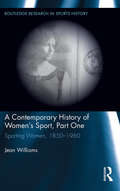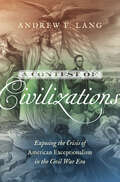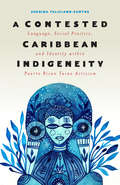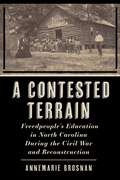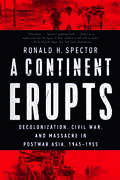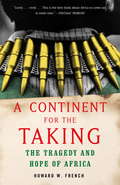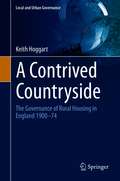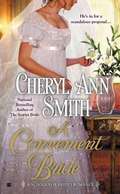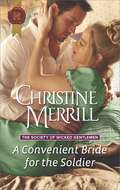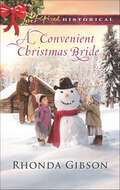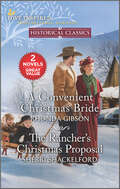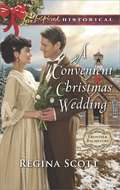- Table View
- List View
A Constellation of Authority: Castilian Bishops and the Secular Church During the Reign of Alfonso VIII (Iberian Encounter and Exchange, 475–1755)
by Kyle C. LincolnDuring the long reign of Alfonso VIII, Castilian bishops were crusaders, castellans, cathedral canons, and collegiate officers, and they served as powerful intermediaries between the pope and the king of Castile. In A Constellation of Authority, Kyle C. Lincoln traces the careers of a septet of these bishops and uses this history to fill in much of what really happened in thirteenth-century Castile.The relationships that local prelates cultivated with Alfonso VIII and the Castilian royal family existed in tension with how they related to the reigning pope. Drawing on diocesan archives, monastic collections, and chronicles, Lincoln reconstructs the complex negotiations and navigations these bishops undertook to maintain the balance among the papal and royal agendas and their own interests. Lincoln examines the bishops' ties to crusades and political influence, the growth of canon and Roman law, religious and church reform, and the canonization of local leaders. In the process, he makes the case that the medieval past is best illuminated by the combined luminescence of a “constellation of authority” represented, at least in part, by a conglomerate of bishops.Through seven case studies, each examining a prelate in his individual historical context, A Constellation of Authority improves our understanding of the politics of thirteenth-century Castile and provides an important foundation for further consideration of the ties between Castile and the broader European medieval world. It will appeal to medieval Hispanists and historians of the medieval church and episcopacy.
A Constitution for the Living: Imagining How Five Generations of Americans Would Rewrite the Nation's Fundamental Law
by Beau BreslinWhat would America's Constitutions have looked like if each generation wrote its own? "The earth belongs...to the living, the dead have neither powers nor rights over it." These famous words, written by Thomas Jefferson to James Madison, reflect Jefferson's lifelong belief that each generation ought to write its own Constitution. According to Jefferson each generation should take an active role in endorsing, renouncing, or changing the nation's fundamental law. Perhaps if he were alive today to witness our seething debates over the state of American politics, he would feel vindicated in this belief. Madison's response was that a Constitution must endure over many generations to gain the credibility needed to keep a nation strong and united. History tells us that Jefferson lost that debate. But what if he had prevailed? In A Constitution for the Living, Beau Breslin reimagines American history to answer that question. By tracing the story from the 1787 Constitutional Convention up to the present, Breslin presents an engaging and insightful narrative account of historical figures and how they might have shaped their particular generation's Constitution. Readers are invited to join the Founders in candlelit taverns where, over glasses of wine, they debated fundamental issues; to witness towering figures of American history, from Abraham Lincoln to Booker T. Washington, enact an alternate account through startling and revealing conversations; and to attend a Constitutional Convention taking place in the present day. These possibilities come to life in the book's prose, with sensitivity, verve, and compelling historical detail. This book is, above all, a call for a more engaged American public at a time when change seems close at hand, if we dare to imagine it.
A Constitution of Many Minds: Why the Founding Document Doesn't Mean What It Meant Before
by Cass R. SunsteinThe future of the U.S. Supreme Court hangs in the balance like never before. Will conservatives or liberals succeed in remaking the court in their own image? In A Constitution of Many Minds, acclaimed law scholar Cass Sunstein proposes a bold new way of interpreting the Constitution, one that respects the Constitution's text and history but also refuses to view the document as frozen in time. Exploring hot-button issues ranging from presidential power to same-sex relations to gun rights, Sunstein shows how the meaning of the Constitution is reestablished in every generation as new social commitments and ideas compel us to reassess our fundamental beliefs. He focuses on three approaches to the Constitution--traditionalism, which grounds the document's meaning in long-standing social practices, not necessarily in the views of the founding generation; populism, which insists that judges should respect contemporary public opinion; and cosmopolitanism, which looks at how foreign courts address constitutional questions, and which suggests that the meaning of the Constitution turns on what other nations do. Sunstein demonstrates that in all three contexts a "many minds" argument is at work--put simply, better decisions result when many points of view are considered. He makes sense of the intense debates surrounding these approaches, revealing their strengths and weaknesses, and sketches the contexts in which each provides a legitimate basis for interpreting the Constitution today. This book illuminates the underpinnings of constitutionalism itself, and shows that ours is indeed a Constitution, not of any particular generation, but of many minds.
A Constitutional Culture: New England and the Struggle Against Arbitrary Rule in the Restoration Empire (Early American Studies)
by Adrian Chastain WeimerIn A Constitutional Culture, Adrian Chastain Weimer uncovers the story of how, more than a hundred years before the American Revolution, colonists pledged their lives and livelihoods to the defense of local political institutions against arbitrary rule.With the return of Charles II to the English throne in 1660, the puritan-led colonies faced enormous pressure to conform to the crown’s priorities. Charles demanded that puritans change voting practices, baptismal policies, and laws, and he also cast an eye on local resources such as forests, a valuable source of masts for the English navy. Moreover, to enforce these demands, the king sent four royal commissioners on warships, ostensibly headed for New Netherland but easily redirected toward Boston. In the face of this threat to local rule, colonists had to decide whether they would submit to the commissioners’ authority, which they viewed as arbitrary because it was not accountable to the people, or whether they would mobilize to defy the crown.Those resisting the crown included not just freemen (voters) but also people often seen as excluded or marginalized such as non-freemen, indentured servants, and women. Together they crafted a potent regional constitutional culture in defiance of Charles II that was characterized by a skepticism of metropolitan ambition, a defense of civil and religious liberties, and a conviction that self-government was divinely sanctioned. Weimer shows how they expressed this constitutional culture through a set of well-rehearsed practices—including fast days, debates, committee work, and petitions. Equipped with a ready vocabulary for criticizing arbitrary rule, with a providentially informed capacity for risk-taking, and with a set of intellectual frameworks for divided sovereignty, the constitutional culture that New Englanders forged would not easily succumb to an imperial authority intent on consolidating its power.
A Constitutional History of England: 1642-1801 (Routledge Revivals)
by Mark A. ThomsonFirst published in 1938 A Constitutional History of England presents a comprehensive overview of various aspects and problems of English Constitutional history. Divided into six major parts it discusses important themes like parliament and the King; the period of the Restoration 1660-88; the revolution settlement 1689-1719; the age of conservatism 1720-1801; administrative developments 1660-1801; English local government; the problem of sovereignty; church and state; the forces of the Crown; and the press. This book is a must read for scholars and researchers of British history, and English Constitutional history.
A Constitutional History of India, 1600-1935: 1600-1935 (Routledge Library Editions: British in India #5)
by Arthur Berriedale KeithThis book, first published in 1936, provides a comprehensive description and analysis of every constitutional aspect of British rule in India from 1600 to 1936. Beginning with a description of the East India Company before Plassey, its constitution, administration of settlements, and relation to the Indian states, the book closes with an account of the reforms of the 1930s, the events leading up to the White Paper and an analysis and elucidation of the Government of India Act 1935.
A Constitutional History of the Kingdom of Eswatini (African Histories and Modernities)
by Hlengiwe Portia DlaminiSwaziland—recently renamed Eswatini—is the only nation-state in Africa with a functioning indigenous political system. Elsewhere on the continent, most departing colonial administrators were succeeded by Western-educated elites. In Swaziland, traditional Swazi leaders managed to establish an absolute monarchy instead, qualified by the author as benevolent and people-centred, a system which they have successfully defended from competing political forces since the 1970s. This book is the first to study the constitutional history of this monarchy. It examines its origins in the colonial era, the financial support it received from white settlers and apartheid South Africa, and the challenges it faced from political parties and the judiciary, before King Sobhuza II finally consolidated power in 1978 with an auto-coup d’état. As Hlengiwe Dlamini shows, the history of constitution-making in Swaziland is rich, complex, and full of overlooked insight for historians of Africa.
A Constructed Peace: The Making of the European Settlement, 1945-1963 (Princeton Studies in International History and Politics #79)
by Marc TrachtenbergPeople still think of the Cold War as a simple two-sided conflict, a kind of gigantic arm wrestle on a global scale," writes Marc Trachtenberg, "but this view fails to grasp the essence of what was really going on." America and Russia were both willing to live with the status quo in Europe. What then could have generated the kind of conflict that might have led to a nuclear holocaust? This is the great puzzle of the Cold War, and in this book, the product of nearly twenty years of work, Trachtenberg tries to solve it.The answer, he says, has to do with the German question, especially with the German nuclear question. These issues lay at the heart of the Cold War, and a relatively stable peace took shape only when they were resolved. The book develops this argument by telling a story--a complex story involving many issues of detail, but focusing always on the central question of how a stable international system came into being during the Cold War period. A Constructed Peace will be of interest not just to students of the Cold War, but to people concerned with the problem of war and peace, and in particular with the question of how a stable international order can be constructed, even in our own day.
A Consumers' Republic: The Politics of Mass Consumption in Postwar America
by Lizabeth CohenIn this signal work of history, Bancroft Prize winner and Pulitzer Prize finalist Lizabeth Cohen shows how the pursuit of prosperity after World War II fueled our pervasive consumer mentality and transformed American life.Trumpeted as a means to promote the general welfare, mass consumption quickly outgrew its economic objectives and became synonymous with patriotism, social equality, and the American Dream. Material goods came to embody the promise of America, and the power of consumers to purchase everything from vacuum cleaners to convertibles gave rise to the power of citizens to purchase political influence and effect social change. Yet despite undeniable successes and unprecedented affluence, mass consumption also fostered economic inequality and the fracturing of society along gender, class, and racial lines. In charting the complex legacy of our "Consumers' Republic" Lizabeth Cohen has written a bold, encompassing, and profoundly influential book.From the Trade Paperback edition.
A Consuming Fire
by Laura E. Weymouth&“Achingly lovely and luminous…left me completely enthralled.&” —Erin A. Craig, New York Times bestselling author of House of Salt and Sorrows Uprooted meets The Grace Year in this dark young adult fantasy of love and vengeance following a girl who vows to kill a god after her sister is unjustly slain by his hand &“that will appeal to readers of Leigh Bardugo and Holly Black&” (School Library Journal).Weatherell girls aren&’t supposed to die. Once every eighteen years, the isolated forest village of Weatherell is asked to send one girl to the god of the mountain to give a sacrifice before returning home. Twins Anya and Ilva Astraea are raised with this destiny in mind, and when their time comes, spirited Ilva volunteers to go. Her devoted sister Anya is left at home to pray for Ilva&’s safe return. But Anya&’s prayers are denied. With her sister dead, Anya volunteers to make a journey of her own to visit the god of the mountain. But unlike her sister, sacrifice is the furthest thing from Anya&’s mind. Anya has no intention of giving anything more to the god, or of letting any other girl do so ever again. Anya Astraea has not set out to placate a god. She&’s set out to kill one.
A Contagious Cause: The American Hunt for Cancer Viruses and the Rise of Molecular Medicine
by Robin Wolfe SchefflerIs cancer a contagious disease? In the late nineteenth century this idea, and attending efforts to identify a cancer “germ,” inspired fear and ignited controversy. Yet speculation that cancer might be contagious also contained a kernel of hope that the strategies used against infectious diseases, especially vaccination, might be able to subdue this dread disease. Today, nearly one in six cancers are thought to have an infectious cause, but the path to that understanding was twisting and turbulent. ?A Contagious Cause is the first book to trace the century-long hunt for a human cancer virus in America, an effort whose scale exceeded that of the Human Genome Project. The government’s campaign merged the worlds of molecular biology, public health, and military planning in the name of translating laboratory discoveries into useful medical therapies. However, its expansion into biomedical research sparked fierce conflict. Many biologists dismissed the suggestion that research should be planned and the idea of curing cancer by a vaccine or any other means as unrealistic, if not dangerous. Although the American hunt was ultimately fruitless, this effort nonetheless profoundly shaped our understanding of life at its most fundamental levels. A Contagious Cause links laboratory and legislature as has rarely been done before, creating a new chapter in the histories of science and American politics.
A Contemporary Historiography of Economics (Routledge Studies in the History of Economics)
by E. Roy Weintraub Till DüppeIn recent years, the focus of historians of economic thought has changed to also include the ideas and practices of contemporary economists. This has opened up new questions regarding the utilization of sources, choice of method, narrative styles, and ethical issues, as well as a new awareness of the historian’s place, role, and task. This book brings together leading contributors to provide, for the first time, a methodological overview of the historiography of economics. Emphasising the quality of the scholarship of recent decades, the book seeks to provide research tools for future historians of economic thought, as well as to any historians of social science with an interest in historiographic issues.
A Contemporary History of Women's Sport, Part One: Sporting Women, 1850-1960 (Routledge Research in Sports History #3)
by Jean WilliamsThis book is an historical survey of women’s sport from 1850-1960. It looks at some of the more recent methodological approaches to writing sports history and raises questions about how the history of women’s sport has so far been shaped by academic writers. Questions explored in this text include: What are the fresh perspectives and newly available sources for the historian of women’s sport? How do these take forward established debates on women’s place in sporting culture and what novel approaches do they suggest? How can our appreciation of fashion, travel, food and medical history be advanced by looking at women’s involvement in sport? How can we use some of the current ideas and methodologies in the recent literature on the history and sociology of sport in order to look afresh at women’s participation? Jean Williams’s original research on these topics and more will be a useful resource for scholars in the fields of sports, women’s studies, history and sociology.
A Contest of Civilizations: Exposing the Crisis of American Exceptionalism in the Civil War Era (Littlefield History of the Civil War Era)
by Andrew F. LangMost mid-nineteenth-century Americans regarded the United States as an exceptional democratic republic that stood apart from a world seemingly riddled with revolutionary turmoil and aristocratic consolidation. Viewing themselves as distinct from and even superior to other societies, Americans considered their nation an unprecedented experiment in political moderation and constitutional democracy. But as abolitionism in England, economic unrest in Europe, and upheaval in the Caribbean and Latin America began to influence domestic affairs, the foundational ideas of national identity also faced new questions. And with the outbreak of civil war, as two rival governments each claimed the mantle of civilized democracy, the United States' claim to unique standing in the community of nations dissolved into crisis. Could the Union chart a distinct course in human affairs when slaveholders, abolitionists, free people of color, and enslaved African Americans all possessed irreconcilable definitions of nationhood? In this sweeping history of political ideas, Andrew F. Lang reappraises the Civil War era as a crisis of American exceptionalism. Through this lens, Lang shows how the intellectual, political, and social ramifications of the war and its meaning rippled through the decades that followed, not only for the nation's own people but also in the ways the nation sought to redefine its place on the world stage.
A Contest of Ideas: Capital, Politics and Labor
by Nelson LichtensteinFor more than thirty years Nelson Lichtenstein has deployed his scholarship--on labor, politics, and social thought--to chart the history and prospects of a progressive America. A Contest of Ideas collects and updates many of Lichtenstein's most provocative and controversial essays and reviews. These incisive writings link the fate of the labor movement to the transformations in the shape of world capitalism, to the rise of the civil rights movement, and to the activists and intellectuals who have played such important roles. Tracing broad patterns of political thought, Lichtenstein offers important perspectives on the relationship of labor and the state, the tensions that sometimes exist between a culture of rights and the idea of solidarity, and the rise of conservatism in politics, law, and intellectual life. The volume closes with portraits of five activist intellectuals whose work has been vital to the conflicts that engage the labor movement, public policy, and political culture.
A Contested Caribbean Indigeneity: Language, Social Practice, and Identity within Puerto Rican Taíno Activism (Critical Caribbean Studies)
by Sherina Feliciano-SantosA Contested Caribbean Indigeneity is an in-depth analysis of the debates surrounding Taíno/Boricua activism in Puerto Rico and the Caribbean diaspora in New York City. Drawing on in-depth ethnographic research, media analysis, and historical documents, the book explores the varied experiences and motivations of Taíno/Boricua activists as well as the alternative fonts of authority they draw on to claim what is commonly thought to be an extinct ethnic category. It explores the historical and interactional challenges involved in claiming membership in, what for many Puerto Ricans, is an impossible affiliation. In focusing on Taíno/Boricua activism, the books aims to identify a critical space from which to analyze and decolonize ethnoracial ideologies of Puerto Ricanness, issues of class and education, Puerto Rican nationalisms and colonialisms, as well as important questions regarding narrative, historical memory, and belonging.
A Contested Terrain: Freedpeople's Education in North Carolina During the Civil War and Reconstruction (Reconstructing America)
by AnneMarie BrosnanA testament to the resilience and determination of Black North Carolinians to achieve educational equalityThis book examines the educational experiences of Black North Carolinians during the American Civil War and Reconstruction period, 1861–1877. By highlighting the collaborative efforts that led to the growing network of schools for the formerly enslaved people, it argues that schooling the Freedpeople was a contested terrain, fraught with conflicting visions of Black freedom and the role education should play. Although Black men and women emerged as the driving force behind the educational endeavors of this period, their work was facilitated by Northern aid and missionary societies, the federally-mandated Freedmen’s Bureau, and over 1,400 teachers from various regional and racial backgrounds. Yet the educational landscape was far from uniform, and the individuals and organizations involved had their distinct visions regarding the nature and purpose of Freedpeople’s education.Through the use of qualitative and quantitative research methods, this book offers new insights into the reasons why Black and white Northerners and Southerners elected to become teachers. By examining their diverse motivations and experiences, it argues that attitudes toward Freedpeople’s education were complex and fluid, defying neat characterization.Despite mounting obstacles and opposition to their work, Black North Carolinians’ unrelenting quest for education ultimately gave rise to free public schooling for both races, the professionalization of Black teachers, and an extensive network of Historically Black Colleges and Universities.
A Continent Erupts: Decolonization, Civil War, And Massacre In Postwar Asia, 1945?1955
by Ronald H. SpectorA Foreign Affairs Best Book of 2022 "Marvelous.…Spector’s gripping book.…[helps] us to understand why the legacy of these conflicts is still with us today." —Sheila Miyoshi Jager, New York Times Book Review The end of World War II led to the United States’ emergence as a global superpower. For war-ravaged Western Europe it marked the beginning of decades of unprecedented cooperation and prosperity that one historian has labeled “the long peace.” Yet half a world away, in China, Indonesia, Vietnam, Korea, and Malaya—the fighting never really stopped, as these regions sought to completely sever the yoke of imperialism and colonialism with all-too-violent consequences. East and Southeast Asia quickly became the most turbulent regions of the globe. Within weeks of the famous surrender ceremony aboard the U.S.S. Missouri, civil war, communal clashes, and insurgency engulfed the continent, from Southeast Asia to the Soviet border. By early 1947, full-scale wars were raging in China, Indonesia, and Vietnam, with growing guerrilla conflicts in Korea and Malaya. Within a decade after the Japanese surrender, almost all of the countries of South, East, and Southeast Asia that had formerly been conquests of the Japanese or colonies of the European powers experienced wars and upheavals that resulted in the deaths of at least 2.5 million combatants and millions of civilians. With A Continent Erupts, acclaimed military historian Ronald H. Spector draws on letters, diaries, and international archives to provide, for the first time, a comprehensive military history and analysis of these little-known but decisive events. Far from being simply offshoots of the Cold War, as they have often been portrayed, these shockingly violent conflicts forever changed the shape of Asia, and the world as we know it today.
A Continent for the Taking: The Tragedy and Hope of Africa
by Howard W. FrenchHoward W. French, a veteran correspondent for The New York Times, gives a compelling firsthand account of some of Africa's most devastating recent history--from the fall of Mobutu Sese Seko, to Charles Taylor's arrival in Monrovia, to the genocide in Rwanda and the Congo that left millions dead. Blending eyewitness reportage with rich historical insight, French searches deeply into the causes of today's events, illuminating the debilitating legacy of colonization and the abiding hypocrisy and inhumanity of both Western and African political leaders. While he captures the tragedies that have repeatedly befallen Africa's peoples, French also opens our eyes to the immense possibility that lies in Africa's complexity, diversity, and myriad cultural strengths. The culmination of twenty-five years of passionate exploration and understanding, this is a powerful and ultimately hopeful book about a fascinating and misunderstood continent.
A Contrived Countryside: The Governance of Rural Housing in England 1900–74 (Local and Urban Governance)
by Keith HoggartThis book shows how governance regimes before the 1970s suppressed rural prospects of housing improvement and created conditions for middle-class capture. Using original archival sources to reveal the intricacies of local and national policy processes, weak rural housing performances are shown to owe more to national governance regimes than local under-performance. Looking `behind the scenes' at policy processes highlights neglected principles in national governance, and shows how investigating rural housing is fundamental to understanding the national scene. With original insights and a new analytical perspective, this volume offers evidence and conclusions that challenge mainstream assumptions in public policy, housing, rural studies and planning.
A Convenient Bride
by Cheryl Ann SmithA headstrong beauty propositions an unlikely highwayman in this delightful regency historical romance. On the hunt for his runaway sister, Lord Richard Ellerby stops a suspicious carriage at gunpoint and is shocked to be mistaken for a thieving highwayman. When the attractive woman inside makes him an offer to court her for pay, Richard refuses and sends her on her way. But the determined lady soon finds him again and proposes an even more outrageous offer: wedding her in a marriage of convenience. Desperate to find love with a man of her own choosing, Lady Brenna Harrington will do anything to hold on to her freedom, even if it means propositioning a dangerous highwayman. If she can distract her father with a prospective husband who only wants to marry her for her fortune, Brenna will have time to do things her way. While her plan may be just crazy enough to work, her unsuitable suitor has other more pleasurable strategies in mind...
A Convenient Bride for the Soldier: A Regency Historical Romance (The Society of Wicked Gentlemen #1)
by Christine MerrillBought for Ten Thousand Pounds!Ex-soldier Frederick Challenger may own a share of London’s most secret gentlemen’s club, but he has long since stopped sampling its delights…until a beautiful woman auctions her innocence.Georgiana Knight’s plan had been to lure in a villain, but instead she’s trapped the devil himself. And now, to protect her reputation, she must marry him! But if Frederick has hopes of taming this temptress, he’ll have to think again…The Society of Wicked GentlemenThe hour is late and the stakes are high
A Convenient Christmas Bride
by Rhonda GibsonHitched for the Holidays After a pupil's prank forces Anna Mae Leland to take shelter with a widowed sheriff during a blizzard, she loses her teaching job-but gains a fiancé. Josiah Miller needs a mother for his twin daughters and Anna Mae needs to protect her reputation. This business-only arrangement means the recently jilted Anna Mae need never risk the folly of love again. Josiah has long admired the town's spirited schoolteacher from afar. In close quarters, she's an ideal friend and helpmate. Yet Christmas's arrival brings a gift neither dared hope for-a second chance at love and happiness...but only if they'll forego what's practical and follow their hearts.
A Convenient Christmas Bride and The Rancher's Christmas Proposal
by Rhonda Gibson Sherri ShackelfordHitched for the holidays A Convenient Christmas Bride by Rhonda Gibson After a pupil's prank forces Anna Mae Leland to take shelter with a widowed sheriff during a blizzard, she loses her teaching job—but gains a fiancé. Josiah Miller needs a mother for his twin daughters and Anna Mae needs to protect her reputation. Soon Christmas's arrival brings a gift neither dared hope for—a second chance at love and happiness…but only if they'll forego what's practical and follow their hearts.The Rancher's Christmas Proposal by Sherri Shackelford Single father and rancher Shane McCoy needs help raising his two-year-old twins. An encounter with a lovely stranger offers an unconventional answer to his predicament when she suggests a marriage of convenience. Tessa Spencer needs a fresh start and protection from a vengeful outlaw. Shane's ranch provides refuge, and his children easily win Tessa's affections. But as her past resurfaces, only honesty and trust will make this family Christmas the first of many…
A Convenient Christmas Wedding
by Regina ScottThe Marriage Agreement Proposing a marriage of convenience to a rugged logger is the boldest move of Nora Underhill's sheltered life. In return for Simon Wallin's protection from her overbearing family, the unassuming seamstress offers prime frontier farmland. But their paper marriage changes when Nora's greedy brother tries to draw her back into a life of drudgery. Her only option: move to Simon's farm, and into the center of his loving, unruly family. Years of shouldering responsibility have left Simon cynical and reserved. But little by little, Nora's warmth opens his shuttered heart to joy. With their marriage claim under threat, can this practical arrangement blossom over the holidays...and become a love for all seasons?
